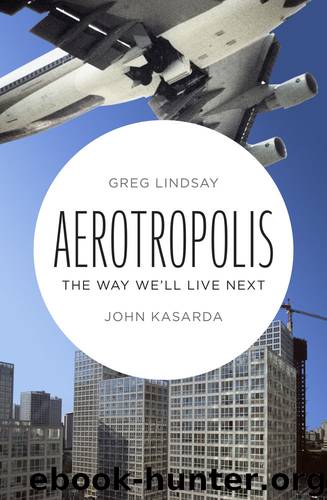Aerotropolis: The Way We'll Live Next by John Kasarda & Greg Lindsay

Author:John Kasarda & Greg Lindsay [Kasarda, John]
Language: eng
Format: epub
ISBN: 9780141944029
Publisher: Penguin Books Ltd
Published: 2011-03-03T00:00:00+00:00
“Public policy, stripped to its basics, is a choice among value alternatives,” Kasarda makes a point of stressing to his M.B.A. students. “What one person will vehemently contend is the correct policy and another will say is wrongheaded will not depend on empirical measurement, but on the person’s values, philosophy, and ideology.”
Our debate over virtue will never be settled, because we’ll never have to settle it. In societies like ours, where beliefs translate to preferences and morals to lifestyles, all virtues are created equal. We’ll vote for them, as always, with our wallets. It is not a stretch to imagine a scenario in which we’ll be able to pick from pull-down menus: local, organic, sustainable, fair trade, and so on, down to the family history and methods of the farmers. Microlending sites like Kiva.org already offer lenders their choice of borrowers. Who’s most worthy: a carpenter in Togo, a rancher in Tajikistan, or a hardware store owner in the Bronx? They all are, but which of their stories resonates with you?
In July 2009, Walmart announced its intention to create its own sustainability index. Unlike Tesco, which took carbon emissions and food miles as its starting points, Walmart calls for a complete life cycle analysis of every product it carries, taking into account not only greenhouse gases but also pesticides, packaging, water use, waste, sustainable sourcing, and sweatshops. The results will appear a few years from now on a scorecard, or color code, or some other way of flagging customers’ attention. “We have to change the way we make and sell products,” said Walmart’s CEO, Lee Scott. “We have to make consumption itself smarter and sustainable”—in other words, more virtuous.
Green advocates hailed its decision as the first step toward sustainable supply chains. No other retailer or company on earth has the reach and heft of Walmart and its $400 billion in revenue. Its suppliers would have no choice but to adopt the index themselves, and in all likelihood, so would other retailers, including Tesco, which is one-fourth its size.
Assuming we’re willing to pay for it, we’re heading toward a future in which the life cycles of all our worldly possessions are known to us, and after that it will be up to each of us to decide who and how best to reward them for their virtue. It won’t be long before we’re able to follow the provenance and path of our lettuce and tomatoes more easily than I was able to track my mother’s tulips through the Aalsmeer’s cool chain. There won’t be any need to ask; the information will be right on the label.
Download
This site does not store any files on its server. We only index and link to content provided by other sites. Please contact the content providers to delete copyright contents if any and email us, we'll remove relevant links or contents immediately.
| Anthropology | Archaeology |
| Philosophy | Politics & Government |
| Social Sciences | Sociology |
| Women's Studies |
Nudge - Improving Decisions about Health, Wealth, and Happiness by Thaler Sunstein(7689)
The Fire Next Time by James Baldwin(5423)
iGen by Jean M. Twenge(5406)
Adulting by Kelly Williams Brown(4564)
The Sports Rules Book by Human Kinetics(4377)
The Hacking of the American Mind by Robert H. Lustig(4368)
The Ethical Slut by Janet W. Hardy(4240)
Captivate by Vanessa Van Edwards(3837)
Mummy Knew by Lisa James(3684)
In a Sunburned Country by Bill Bryson(3530)
The Worm at the Core by Sheldon Solomon(3483)
Ants Among Elephants by Sujatha Gidla(3459)
The 48 laws of power by Robert Greene & Joost Elffers(3228)
Suicide: A Study in Sociology by Emile Durkheim(3011)
The Slow Fix: Solve Problems, Work Smarter, and Live Better In a World Addicted to Speed by Carl Honore(3001)
The Tipping Point by Malcolm Gladwell(2908)
Humans of New York by Brandon Stanton(2864)
Handbook of Forensic Sociology and Psychology by Stephen J. Morewitz & Mark L. Goldstein(2691)
The Happy Hooker by Xaviera Hollander(2683)
